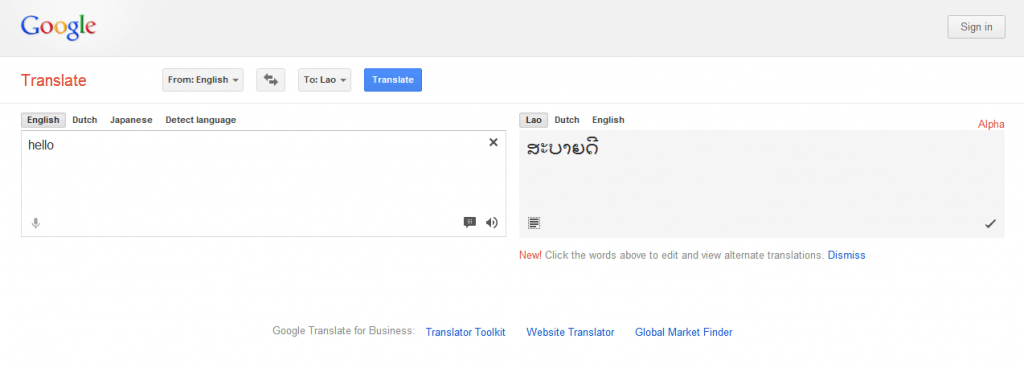![Should You Be an Entrepreneur Should You Be an Entrepreneur]()
ມີຫຼາຍຄົນອາດຈະເລີ່ມຕັ້ງຄຳຖາມວ່າ ເຮົາຄວນເປັນພະນັກງານ ຫຼື ຄວນເປັນຜູ້ປະກອບການດີ? ທ່ານບໍ່ຕ້ອງແປກໃຈດອກ ມີຄົນອີກຈຳນວນຫຼວງຫຼາຍໃນໂລກນີ້ກໍ່ຕັ້ງຄຳຖາມນີ້ຄືກັນ ເຮົາຈຶ່ງຂໍນຳສະເໜີເລື່ອງຂອງການທົດສອບຄວາມເປັນຜູ້ປະກອບການ (entrepreneurship) ມາໃຫ້ອ່ານຫຼິ້ນໆກັນກ່ອນ. ເນື້ອໃນສ່ວນໃຫຍ່ແມ່ນຮຽບຮຽງມາຈາກບົດຂອງອາຈານ Daniel Isenberg ເຊິ່ງໃນເວລາທີ່ຂຽນບົດນັ້ນເພິ່ນເປັນສາດສະດາຈານທາງດ້ານ Management Practice ທີ່ Babson College.
ທ່ານຄິດວ່າໝູ່ຂອງທ່ານເປັນຜູ້ປະກອບການ ທ່ານກໍ່ເລີຍຢາກເປັນນຳເຂົາບໍ່ ? ຄວາມຈິງແລ້ວໃນຖານະທີ່ເປັນຄົນເຮັດວຽກຄົນໜຶ່ງ ຄັ້ງໜຶ່ງໃນເສັ້ນທາງອາຊີບຂອງທ່ານ ທ່ານກໍ່ຄວນຈະຕັ້ງຄຳຖາມນີ້ກັບຕົນເອງເບິ່ງໃດ໋. ຈາກປະສົບການການເປັນຜູ້ປະກອບການຂອງເພິ່ນເອງ ບວກກັບການເປັນນັກວິຊາການທາງດ້ານນີ້ ອາຈານ Daniel Isenberg ໄດ້ພັດທະນາການທົດສອບຄວາມເປັນຜູ້ປະກອບການທີ່ເອິ້ນວ່າ Isenberg Entrepreneur Test ຂຶ້ນ. ມາ ທ່ານຜູ້ອ່ານ ມາລອງຕອບແບບທົດສອບນີ້ນຳກັນເບິ່ງ ຫາກທ່ານຢາກໄດ້ຄຳຕອບທີ່ກົງໄປກົງມາ ທ່ານກໍ່ຕ້ອງຕອບຄຳຖາມເຫຼົ່ານີ້ຢ່າງກົງໄປກົງມາເດີ້ ຕອບງ່າຍໆວ່າ ແມ່ນຫຼືບໍ່ແມ່ນ ກໍ່ພໍ.
1. ຂ້ອຍບໍ່ມັກໃຫ້ຄົນອຶ່ນທີ່ມີຄວາມສາມາດໜ້ອຍກວ່າຂ້ອຍບອກວ່າ ຂ້ອຍຄວນເຮັດຫຍັງ .
2. ຂ້ອຍມັກທ້າທາຍຕົນເອງ.
3. ຂ້ອຍມັກການເອົາຊະນະ.
4. ຂ້ອຍມັກເປັນນາຍຂອງຕົນເອງ.
5. ຍາມໃດຂ້ອຍກໍ່ມັກຄົ້ນຫາວິທີການເຮັດວຽກທີ່ໃໝ່ ແລະ ດີກວ່າເກົ່າ.
6. ຂ້ອຍມັກຕັ້ງຄຳຖາມກັບກົດ ຫຼືວ່າ ລະບຽບປະຕິບັດທົ່ວໄປທີ່ທຸກຄົນເຮັດຢູ່.
7. ຂ້ອຍມັກຊວນຄົນຫຼາຍໆປະເພດມາຢູ່ຮ່ວມກັນ ແລ້ວເຮັດສິ່ງໃດໜຶ່ງນຳກັນໃຫ້ແລ້ວ.
8. ຄົນອຶ່ນມັກຈະຕື່ນເຕັ້ນໄປກັບຄວາມຄິດຂອງຂ້ອຍ.
9. ຂ້ອຍບໍ່ຄ່ອຍພໍໃຈກັບຜົນງານຕົນເອງ.
10. ຂ້ອຍຢູ່ລ້າໆບໍ່ເປັນ.
11. ເມື່ອພົບກັບຄວາມຫຍຸ້ງຍາກ ຍາມໃດຂ້ອຍກໍ່ມີທາງອອກໃຫ້ຕົນເອງສະເໜີ.
12. ຂ້ອຍຍິນດີທີ່ຈະຫຼົ້ມເຫຼວໃນສິ່ງທີ່ຕົນເອງເຮັດ ຫຼາຍກວ່າໄປປະສົບຄວາມສຳເລັດກັບເລື່ອງຂອງຄົນອຶ່ນ.
13. ຍາມໃດທີ່ມີບັນຫາ ຂ້ອຍຍິນດີທີ່ຈະໂດດເຂົ້າຫາທັນທີ.
14. ຂ້ອຍຄິດວ່າ ແມ້ແຕ່ໝາແກ່ ກໍ່ສາມາດຮຽນຮູ້ຫຼືວ່າຄິດຄົ້ນເຕັກນິກວິທີການໃໝ່ໆໄດ້.
15. ມີສະມາຊິກໃນຄອບຄົວຂອງຂ້ອຍເຮັດທຸລະກິດຢູ່.
16. ຂ້ອຍມີໝູ່ຫຼາຍຄົນເຮັດທຸລະກິດສ່ວນຕົວ.
17. ໃນເວລາທີ່ຍັງເປັນນັກສຶກສາຢູ່ ຂ້ອຍຊອກວຽກເຮັດໃນໄລຍະພັກຮຽນສະເໝີ.
18. ຂ້ອຍຮູ້ຕື່ນເຕັ້ນຫຼາຍຫາກໄດ້ຂາຍເຄື່ອງ.
19. ການບັນລຸເປົ້າໝາຍເຮັດໃຫ້ຂ້ອຍເບີກບານສະເໝີ.
20. ຂ້ອຍໜ້າຈະຂຽນໂຈດທົດສອບໄດ້ດີກວ່າອາຈານ Isenberg.
ເປັນຈັ່ງໃດ ທ່ານຜູ້ອ່ານ ມີຈັກຂໍ້ທີ່ທ່ານຕອບວ່າ ແມ່ນ (Yes) ແລະ ບໍ່ແມ່ນ (No).
ຫາກວ່າທ່ານຕອບວ່າ ແມ່ນ (Yes) ຮອດ 17ຂໍ້ ຫຼືຫຼາຍກວ່າ ໝາຍຄວາມວ່າ ທ່ານຄວນພິຈາລະນາໃຫ້ດີໆວ່າທ່ານຍັງຢາກນັ່ງເຮັດວຽກໃຫ້ຄົນອຶ່ນຢູ່ບໍ່ ຫຼືວ່າ ຫາກທ່ານຍັງບໍ່ທັນຮຽນຈົບ ເມື່ອຈົບແລະເລີ່ມເຮັດວຽກແລ້ວ ທ່ານກໍ່ຈົ່ງຈື່ໄວ້ວ່າທ່ານມີໂອກາດກ້າວໄປໄດ້ໄກກັບເສັ້ນທາງຂອງການເປັນ ຜູ້ປະກອບການ (entrepreneur) ເຊັ່ນກັນໃດ໋. ຕອນຕໍ່ໄປ ເຮົາຈະມາລົມສູ່ຟັງຕຶ່ມວ່າ ຫາກວ່າທ່ານເໝາະສົມແລ້ວ ຍັງມີຂໍ້ຄວນລະວັງຫຍັງແດ່ທີ່ທ່ານຄວນເອົາໃຈໃສ່.
ເອົາລະ ສຳລັບທ່ານທີ່ໄດ້ຕອບວ່າ ແມ່ນ (Yes) ຮອດ 17ຂໍ້ ຫຼືຫຼາຍກວ່າ ທ່ານຄວນເລິ່ມກວດສອບເບິ່ງບັນຊີເງິນຝາກ ຫຼືວ່າ ໄຫເງິນໄຫຄຳທີ່ເຄີຍໄດ້ຝັງໄວ້ ຈາກນັ້ນກໍ່ແມ່ນຂັ້ນຕອນການທີ່ຕ້ອງຖາມຕົນເອງຄັກໆແນ່ໆແລ້ວວ່າ ທ່ານເອົາແທ້ບໍ່? ທ່ານມີໜີ້ບໍ່? ພາລະທາງການສຶກສາຂອງລູກເດ່ ທ່ານໄດ້ກຽມໄວ້ແດ່ແລ້ວບໍ່? ລອງລົມສູ່ສະມາຊິກໃນຄອບຄົວ ໝູ່ເພື່ອນເບິ່ງວ່າເຂົາເຈົ້າໃຫ້ການສະໜັບສະໜູນທ່ານບໍ່ ? ຫາກວ່າທ່ານໄດ້ຮັບຄຳຕອບໃນທາງທີ່ບວກ ກໍ່ຈົ່ງຢ່າລໍຊ້າ ເລິ່ມຕັ້ງໜ້າຄິດຫາທຸລະກິດທີ່ຕົນເອງຢາກເລິ່ມຕົ້ນໄດ້ເລີຍ.
ອາຍຸເປັນພຽງແຕ່ຕົວເລກ ຜົນການສຶກສາຂອງ Kauffman Foundation ສະແດງໃຫ້ເຫັນວ່າທຸລະກິດທີ່ສ້າງໂດຍຜູ້ທີ່ມີອາຍຸ 50 ປີ ຫຼືຫຼາຍກວ່າແຮ່ງມາແຮ່ງຫຼາຍຂຶ້ນ. ຫາໂອກາດລົມກັບບຸກຄົນທີ່ເຄີຍສ້າງທຸລະກິດຂອງຕົນເອງ ຊອກຮູ້ວ່າເພິ່ນວາງແຜນຈັ່ງໃດ ແລະ ຈາກແຜນນັ້ນເພິ່ນໄດ້ພັດທະນາໃຫ້ກາຍເປັນຜະລິດຕະພັນແລະບໍລິການທີ່ຈັບຕ້ອງໄດ້ຄືແນວໃດ. ນອກນັ້ນ ທ່ານກໍ່ຄວນຫາເວລາລົມກັບຜູ້ທີ່ອາດຈະເປັນລູກຄ້າ ຫຼືວ່າຜູ້ສະໜອງໃນອານາຄົດຫາກທ່ານ ເລີ່ມກິດຈະການຂອງຕົນເອງ.
ໃຫ້ສັງເກດວ່າ ຄຳວ່າ “ຂ້ອຍຢາກສ່ຽງ” ຫຼືວ່າ “ຂ້ອຍກ້າສ່ຽງ” ບໍ່ໄດ້ນອນຢູ່ໃນຂໍ້ສອບຖາມ ເພາະວ່າ ໂດຍທົ່ວໄປຄົນເຮົາບໍ່ໄດ້ເລືອກເປັນຜູ້ປະກອບການຍ້ອຍຢາກສ່ຽງໄພ ແຕ່ວ່າທີ່ສໍາຄັນແລະເຂົາເຈົ້າປຽບທຽບລະຫວ່າງ
ຄວາມສ່ຽງໃນການເຮັດວຽກປະຈຳ ເຊິ່ງອາດຈະປະກອບມີ ຄວາມເບື່ອໃນວຽກ ເຮັດວຽກກັບເຈົ້ານາຍທີ່ບໍ່ດີ ຂາດຄວາມເປັນອິດສະລະ ບໍ່ສາມາດຄວບຄຸມຊະຕາຂອງຕົນເອງໄດ້ເຕັມທີ່ ອາດສ່ຽງຕໍ່ການຖືກໄລ່ອອກ ກັບ
ຄວາມສ່ຽງໃນການປະກອບການ ເຊິ່ງອາດຈະປະກອບມີ ຄວາມຜິດພາດທາງທຸລະກິດ ຄວາມບໍ່ແນ່ນອນທາງດ້ານລາຍຮັບ ຄວາມອາຍ ຫຼື ຄວາມສູນເສຍທາງການລົງທືນຫາກວ່າທຸລະກິດລົ້ມເຫຼວ
ໃນທີ່ສຸດແລ້ວ ຜູ້ທີ່ເລືອກທີ່ຈະເປັນຜູ້ປະກອບການແມ່ນຜູ້ທີ່ເຊື່ອໜັ້ນວ່າ ຄວາມສາມາດຂອງຕົນເອງ (ເຊັ່ນ: ຄວາມເປັນຜູ້ນຳ ຄວາມຮອບຮູ້ ຄວາມກ້າຫານ ແລະ ຄວາມດຸໝັ່ນ) ຫຼືວ່າ ຊັບສິນອຶ່ນໆທີ່ມີຕິດໂຕ (ເຊັ່ນ: ເງິນທຶນ ຊັບສິນທາງປັນຍາ ຂໍ້ມູນ ຖານລູກຄ້າ)
“ຂ້ອຍຢາກກາຍເປັນບຸກຄົນລໍ້າລວຍ” ກໍ່ບໍ່ໄດ້ຢູ່ໃນລາຍການຄຳຖາມເຊັ່ນກັນ. ຄວາມຈິງແລ້ວ ບໍ່ແມ່ນທຸກຄົນທີ່ເປັນຜູ້ປະກອບການແລ້ວຈະກາຍເປັນຄົນລໍ້າລວຍໝົດ ມີພຽງຈຳນວນໜ້ອຍໜຶ່ງເທົ່ານັ້ນທີ່ປະສົບຄວາມສຳເລັດຢ່າງລົ້ນເຫຼືອທາງດ້ານການເງິນ ແລ້ວຖາມວ່າເປັນຄົນເຮົາຈຶ່ງຍັງເລືອກເປັນຜູ້ປະກອບການ ມັນແມ່ນເລື່ອງຂອງຜົນໄດ້ຮັບທາງດ້ານຈິດໃຈຕ່າງຫາກທີ່ເຮັດໃຫ້ເປັນທາງເລືອກທີ່ໜ້າສົນໃຈ ນັ້ນໝາຍເຖິງການມີໂອກາດທີ່ໄດ້ທ້າທາຍ ໄດ້ຮັບຄວາມອິດສະລະ ໄດ້ຮັບການຍອມຮັບ ໄດ້ປົດປ່ອຍຄວາມຄິດສ້າງສັນ ພ້ອມໆກັບການທີ່ໄດ້ປະກອບສ່ວນສ້າງປະໂຫຍດໃຫ້ສ່ວນລວມ.
![108JOB 108JOB]() Re-published from ວາລະສານ 108ອາຊີບ ສະບັບທີ 18 (01-15 Aug, 2012) ໜ້າ 20-21 ແລະ ສະບັບທີ 19 (16-31 Aug, 2012) ໜ້າ 8-9
Re-published from ວາລະສານ 108ອາຊີບ ສະບັບທີ 18 (01-15 Aug, 2012) ໜ້າ 20-21 ແລະ ສະບັບທີ 19 (16-31 Aug, 2012) ໜ້າ 8-9
ອ້າງອີງ: ຮຽບຮຽງຈາກ “Should You Be An Entrepreneur? Take This Test”
by Daniel Isenberg, Professor of Management Practice, Babson College
http://blogs.hbr.org/cs/2010/02/should_you_be_an_entrepreneur.html
Should You Be An Entrepreneur? Take This Test
Re-published from 108job Magazine #18 (01-15 Aug, 2012) pages 20-21 and #19 (16-31 Aug, 2012) pages 8-9
Some of your friends are doing it. People who do it are in the front pages and web almost every day. Even President Obama is talking about it. So should you do it? Should you join the millions of people every year who take the plunge and start their first ventures? I’ve learned in my own years as an entrepreneur — and now an entrepreneurship professor — that there is a gut level “fit” for people who are potential entrepreneurs. There are strong internal drivers that compel people to create their own business. I’ve developed a 2–minute Isenberg Entrepreneur Test, below, to help you find out. Just answer yes or no. Be honest with yourself: the worst lies are the ones we tell ourselves.
- I don’t like being told what to do by people who are less capable than I am.
- I like challenging myself.
- I like to win.
- I like being my own boss.
- I always look for new and better ways to do things.
- I like to question conventional wisdom.
- I like to get people together in order to get things done.
- People get excited by my ideas.
- I am rarely satisfied or complacent.
- I can’t sit still.
- I can usually work my way out of a difficult situation.
- I would rather fail at my own thing than succeed at someone else’s.
- Whenever there is a problem, I am ready to jump right in.
- I think old dogs can learn — even invent — new tricks.
- Members of my family run their own businesses.
- I have friends who run their own businesses.
- I worked after school and during vacations when I was growing up.
- I get an adrenaline rush from selling things.
- I am exhilarated by achieving results.
- I could have written a better test than Isenberg (and here is what I would change ….)
If you answered “yes” on 17 or more of these questions, look at your paycheck (if you are lucky enough to still get one). If the company that issued the check isn’t owned by you, it is time for some soul searching: Do you have debts to pay? Kids in college? Alimony? Want to take it easy? Maybe better to wait. Do you have a little extra cash in the bank and several credit cards? Do you have a spouse, partner, friends, or kids who will cheer you on? If so, start thinking about what kind of business you want to set up. It doesn’t matter what age you are: research by the Kauffman Foundation shows that more and more over–50s are setting up their own businesses. Talk to people who have made the plunge, learn how to plan and deliver a product or service, think about that small business you might buy, talk to people with whom you would like to work, and talk to customers.
“I like to take risks” is not on the list. People don’t choose to be entrepreneurs by opting for a riskier lifestyle. What they do, instead, is reframe the salary vs. entrepreneur choice as between two different sets of risk: the things they don’t like about having a steady job — such as the risk of boredom, working for a bad boss, lack of autonomy, lack of control over your fate, and getting laid off — and the things they fear about being an entrepreneur — possible failure, financial uncertainty, shame or embarrassment, and lost investment. In the end, people who are meant to be entrepreneurs believe that their own abilities (e.g. leadership, resourcefulness, pluck, hard work) or assets (e.g. money, intellectual property, information, access to customers) significantly mitigate the risks of entrepreneurship. Risk is ultimately a personal assessment: what is risky for me is not risky for you.
“I want to get rich” is not on the list either. All else being equal (and all else is rarely equal in the real world), on the average, people who set up their own businesses don’t make more money, although a few do succeed in grabbing the brass ring. But the “psychic benefits” — the challenge, autonomy, recognition, excitement, and creativity — make it all worthwhile.
DANIEL ISENBERG
Daniel Isenberg is Professor of Management Practice, Babson Global, and founding executive director of the Babson Entrepreneurship Ecosystem Project. His most recent HBR article is How to Start an Entrepreneurial Revolution.














































